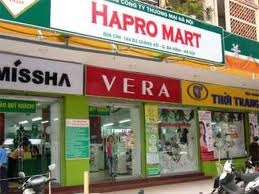Hapro thinks outside the square
 In a recent Hanoi workshop discussing Vietnamese goods in the modern retail system, one of Vietnam’s leading corporations in export, import, production and trade services voiced its proposal to be supported in hiring suitable business spaces in Hanoi and some northern locations to expand footprints in urban and rural areas.
In a recent Hanoi workshop discussing Vietnamese goods in the modern retail system, one of Vietnam’s leading corporations in export, import, production and trade services voiced its proposal to be supported in hiring suitable business spaces in Hanoi and some northern locations to expand footprints in urban and rural areas.
Particularly, Hapro wants to increase visibility of its HaproMart and HaproFood in Hanoi’s crowded residential quarters, resettlement and new urban areas like Trung Hoa-Nhan Chinh, My Dinh, Dinh Cong, Viet Hung and Van Quan.
Hapro also proposed for a specific mechanism giving it the right to hire first floor space at residential blocks in these above urban areas, about one or two venues at each urban area, each venue covering 300-500 square metres to enlarge HaproMart and HaproFood chains.
In this respect, Hanoi Supermarket Association chairman Vu Vinh Phu assumed Hapro had reasons to make the move since the group was expected to become a leader in Hanoi’s trade sector.
Hapro possesses several hundred shops, but up to 30 per cent of them are small in size measuring between 10-20sqm and mingled among private housings, making it difficult to boost trade.
Phu, once the chairman of Hapro founding project and former deputy director of Hanoi Trade Department, did not advocate Hapro’s intention to ask for this special mechanism saying that “Hapro has for long enjoyed too many incentives compared to other Hanoi retailers but has not yet developed effectively. It now needs to compete impartially with other businesses.”
Phu assumed human resources quality was a thorny issue at Hapro. Around 20 per cent of staff at this group are aged above 45 years old whereas half of staff, including top management posts, have yet to be trained in modern trade.
The current operational apparatus remains cumbersome with lax cooperation among different sections. Hapro’s Vietnamese product distributors have paid undue attention to design improvements while materials had to travel different stages, resulted in high input costs.
Besides, Hapro’s negligence to equitising move is believed to hinder the group’s further development in a market economy.
“The ability to grasp opportunities timely is essential in doing business, but Hapro not yet acute in this respect,” Phu said.
Phu said the Hanoi base group would soon open a new trade centre in Cat Linh street for supermarket trading and office space leasing.
“It would be a smart move if it took place a decade ago but not now since office rental has plummeted in recent years,” Phu said.
| Hapro is a state business under direct management of Hanoi People’s Committee. It operates under a parent company and subsidiaries model in three core areas - import export business, home trade and investment-development of trade infrastructure system. After seven years in operation Hapro now consists of an expansive retail network with three big Hapro shopping centres, three market trading venues, 40 supermarkets and convenience shops HaproMart and 40 safe food shops and outlets HaproFood. Besides, it possesses a system of over 100 shops selling electro-mechanical, civil electrical products and garments in Hanoi and some northern locations. Hapro’s retail revenue surpassed VND4 trillion ($190 million) per year in recent years, with revenue from locally made items growing an average 30-50 per cent annually. |
What the stars mean:
★ Poor ★ ★ Promising ★★★ Good ★★★★ Very good ★★★★★ Exceptional
Related Contents
Latest News
More News
- Hermes joins Long Thanh cargo terminal development (February 04, 2026 | 15:59)
- SCG enhances production and distribution in Vietnam (February 04, 2026 | 08:00)
- UNIVACCO strengthens Asia expansion with Vietnam facility (February 03, 2026 | 08:00)
- Cai Mep Ha Port project wins approval with $1.95bn investment (February 02, 2026 | 16:17)
- Repositioning Vietnam in Asia’s manufacturing race (February 02, 2026 | 16:00)
- Manufacturing growth remains solid in early 2026 (February 02, 2026 | 15:28)
- Navigating venture capital trends across the continent (February 02, 2026 | 14:00)
- Motivations to achieve high growth (February 02, 2026 | 11:00)
- Capacity and regulations among British areas of expertise in IFCs (February 02, 2026 | 09:09)
- Transition underway in German investment across Vietnam (February 02, 2026 | 08:00)

 Tag:
Tag:




















 Mobile Version
Mobile Version